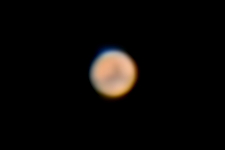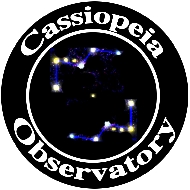Moon, Saturn, Jupiter, Mars imaging
Posted: 30 November 2022
Cloudy nights returned Sunday, 27 November 2022, and continued until Tuesday, 29 November.
|
Open: Tuesday, 29 November 2022, 1814 MST Temperature: 60°F |
Session: 1807 Conditions: Clear |
Equipment:
12" f/8 LX600 w/StarLock
2" 24mm UWA eyepiece
2" 4X Powermate
Camera:
D850 DSLR
SYNCed the observatory clock to WWV time signals.
1820 MST: LX600 ON, StarLock OFF, High Precision OFF.
Viewed the Moon, 102X. Viewed Saturn, 102X. Viewed Jupiter, 102X.
Mounted the D850 DSLR at prime focus. Took this image of the near First Quarter Moon (1/400sec, ISO 200).

I then set up to do some long focal length imaging, but intially had a problem with aligning the finderscope to match the camera field-of-view. I finally resolved the issue and did some imaging of Saturn, Jupiter, and then Mars with the D850 DSLR at prime focus + 4X Powermate. I took single frame images and 1080p/60fps videos of each planet. Here are the best results.
Saturn (stack of 1498 video frames, 1/100sec, ISO 6400)

Jupiter & Great Red Spot (stack of 1330 video frames, 1/160sec, ISO 1600)

Jupiter, Great Red Spot, & Io shadow (single image, 1/160sec, ISO 2500)

Mars (stack of 1220 video frames, 1/200sec, ISO 2500)

Viewed Mars, 406X and 102X. Mars was still low in the eastern sky, but at about the same location as it will be for next week's lunar occultation.
1959 MST: LX600 OFF.
|
Close: Tuesday, 29 November 2022, 2010 MST Temperature: 47°F |
Session Length: 1h 56m Conditions: Clear |
Comments are welcome using Email. Twitter users can use the button below to tweet this report to their followers. Thanks.
Cassiopeia Observatory Home Page
Copyright ©2022 Michael L. Weasner / mweasner@mac.com. Email Etiquette.
URL = http://www.weasner.com/co/Reports/2022/11/30/index.html
